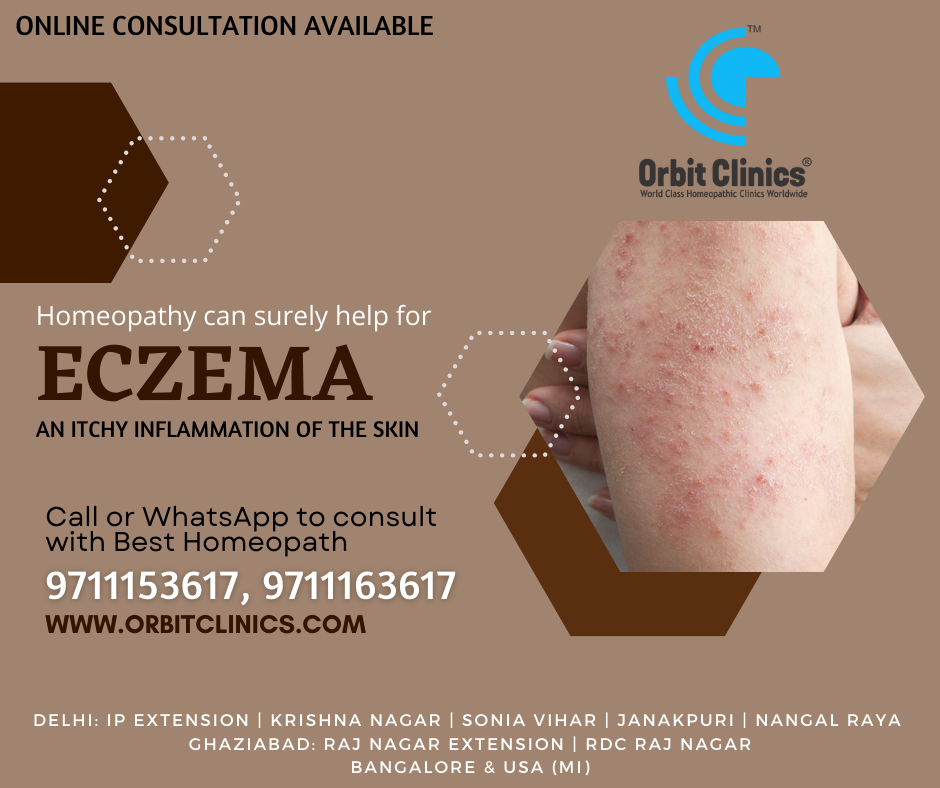Written by
Dr. Deepak Sharma
Homeopathic Physician and Educator
Best Homeopathic Doctor in Delhi & NCR
Founder – Orbit Clinics
Executive Director – HWC

Abstract:
Eczema is a common skin condition affecting millions worldwide, characterized by redness, itchiness, and inflammation. This article explores the various forms of eczema, their underlying causes, and the latest treatment approaches. The most common types of eczema include atopic dermatitis, contact dermatitis, dyshidrotic eczema, nummular eczema, seborrheic dermatitis, and stasis dermatitis. The exact cause of eczema is unknown, but it is believed to result from a combination of genetic, immunological, and environmental factors, as well as imbalances in the skin microbiome. Common symptoms include dry, sensitive skin, intense itching, redness, oozing or crusting, raised bumps, darkened or leathery skin, coin-shaped patches, and swelling. Homeopathic remedies, tailored to individual symptoms and triggers, can be employed to address the underlying causes and strengthen the body’s natural defense mechanisms.
Introduction:
Eczema, a term used to describe a group of skin conditions, is one of the most common dermatological issues affecting millions of people worldwide. Characterized by redness, itchiness, and inflammation, eczema can be a persistent and debilitating condition for those who suffer from it. This article aims to shed light on the intricacies of eczema, its various forms, underlying causes, and the latest developments in treatment and management. While the term eczema is often used interchangeably with atopic dermatitis, it’s crucial to understand that eczema is an umbrella term encompassing various skin conditions.
Types:
Some of the most common types of eczema include:
- Atopic Dermatitis
Atopic dermatitis is the most common form of eczema, often beginning in childhood and persisting into adulthood. It is characterized by dry, itchy, and inflamed skin that may become cracked or scaly. Atopic dermatitis is frequently linked to a family history of allergies, asthma, or hay fever, as it is an immune-related disorder. Triggers can include environmental factors, irritants, stress, or infections.
- Contact Dermatitis
Contact dermatitis is caused by direct contact with an irritant or allergen, leading to redness, itching, and inflammation. It is divided into two categories: irritant contact dermatitis and allergic contact dermatitis. Irritant contact dermatitis occurs when the skin is exposed to harsh chemicals, soaps, or detergents, while allergic contact dermatitis is an immune response to an allergen, such as nickel, latex, or poison ivy.
- Dyshidrotic Eczema
Dyshidrotic eczema, also known as pompholyx, is characterized by the formation of small, itchy blisters on the hands and feet. It is more common in women and often worsens during periods of stress or exposure to certain allergens. The exact cause of dyshidrotic eczema is unknown, but it may be linked to genetics, allergies, or other factors.
- Nummular Eczema
Nummular eczema, or discoid eczema, presents as coin-shaped patches of itchy, dry, and inflamed skin, usually on the limbs. The cause of nummular eczema is unknown, but it is often associated with dry skin, cold weather, and a history of atopic dermatitis or allergies. Treatment typically involves moisturizing, avoiding irritants, and using topical corticosteroids.
- Seborrheic Dermatitis
Seborrheic dermatitis, commonly referred to as dandruff, affects areas of the body with high concentrations of oil-producing glands, such as the scalp, face, and upper chest. It is characterized by red, itchy, flaky skin, and may be caused by a combination of factors, including yeast overgrowth, hormonal fluctuations, and genetics.
- Stasis Dermatitis
Stasis dermatitis, also known as venous eczema, is a condition that affects the lower legs and is often associated with poor circulation and chronic venous insufficiency. It presents as swollen, itchy, and discolored skin, and may lead to skin ulcers if left untreated. Treatment often focuses on improving blood flow and reducing inflammation.
The Underlying Causes of Eczema:
The exact cause of eczema remains elusive, but it is widely believed that a combination of genetic, immunological, and environmental factors contribute to its development. Research indicates that individuals with eczema have an impaired skin barrier, leading to increased water loss and susceptibility to allergens and irritants. Additionally, an overactive immune response exacerbates inflammation and itching, perpetuating the vicious cycle of eczema.
Recent studies have also highlighted the role of the skin microbiome – the collection of microorganisms living on the skin’s surface – in the development and maintenance of eczema. Imbalances in the skin microbiome can contribute to inflammation and the persistence of eczema symptoms.
Symptoms and Signs:
The various symptoms and signs of eczema help you better understand and manage this prevalent skin disorder.
- Dry, sensitive skin
One of the most common symptoms of eczema is dry, sensitive skin. The skin’s natural barrier is compromised, causing it to lose moisture and become more susceptible to irritants. This dryness can lead to itching and discomfort, which can further exacerbate the condition.
- Intense itching
Itching is the hallmark symptom of eczema and can be extremely bothersome. The itchiness can range from mild to severe and often worsens at night. Scratching may provide temporary relief but can lead to skin damage, infection, and worsening of eczema.
- Red, inflamed skin
Eczema often presents as red, inflamed patches on the skin. These areas can appear anywhere on the body but are most commonly found on the face, hands, wrists, and behind the knees. The skin may become thickened, scaly, and discolored over time, particularly in response to chronic scratching.
- Oozing or crusting
In some cases, eczema can cause the skin to weep, leading to the formation of crusts or scabs. This is typically seen in more severe cases or when an infection is present. The oozing and crusting can be uncomfortable and unsightly, making it essential to seek appropriate treatment.
- Small, raised bumps
Eczema can also present with small, raised bumps, known as vesicles or papules. These bumps may burst and leak fluid when scratched, further contributing to the oozing and crusting.
- Darkened or leathery skin
Chronic eczema can result in skin changes, such as darkening or the development of a leathery texture. This is due to long-term inflammation and scratching, which can cause the skin to thicken (lichenification) and become discolored.
- Coin-shaped patches
Another manifestation of eczema is the appearance of coin-shaped patches, known as nummular eczema or discoid eczema. These round, itchy lesions can occur anywhere on the body and are more common in adults than children.
- Swelling and warmth
Inflamed eczema can cause the affected area to swell and feel warm to the touch. This is a result of increased blood flow to the area in response to inflammation.
The Homeopathic Approach to Eczema:
Homeopathy, a system of alternative medicine developed in the late 18th century by Samuel Hahnemann, is based on the principle of “like cures like.” This means that substances that cause symptoms in healthy individuals can be used in diluted forms to treat similar symptoms in sick individuals. Homeopathy emphasizes the individualization of treatment, tailoring remedies to each patient’s unique symptoms and experiences.
In the context of eczema, homeopathy seeks to address the underlying cause of the condition and strengthen the body’s natural defense mechanisms. By doing so, it aims to minimize flare-ups and alleviate symptoms. Homeopathic practitioners consider factors such as the patient’s physical, emotional, and mental health when prescribing remedies.
Common Homeopathic Remedies for Eczema
There are numerous homeopathic remedies that may be employed to treat eczema, depending on the specific symptoms and triggers. Some of the most common remedies include:
- Graphites: Typically prescribed for patients with thick, cracked, and oozing skin accompanied by a burning sensation.
- Sulphur: Suitable for those with red, itchy, and inflamed skin that worsens with heat and bathing.
- Calcarea Carbonica: Often recommended for patients experiencing eczema on the scalp, accompanied by an intolerance to cold temperatures.
- Natrum Muriaticum: Used for dry, flaky skin that worsens with exposure to sunlight and emotional stress.
- Arsenicum Album: Prescribed for patients with burning, itching, and dry skin that improves with warmth and worsens at night.
- Rhus Toxicodendron: Suitable for individuals with vesicular eruptions and intense itching that improves with hot applications.



